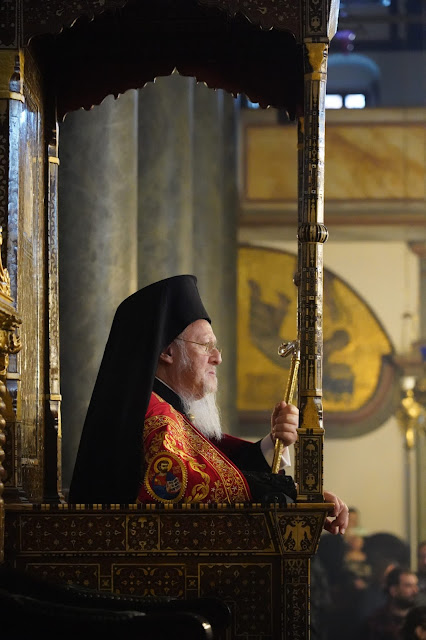Catechetical Homily at the Opening of Holy and Great Lent (2023)
+ BARTHOLOMEW
By God’s mercy Archbishop of Constantinople-New Rome
and Ecumenical Patriarch
To the Plenitude of the Church
May the Grace and Peace of our Lord and Savior Jesus Christ,
Together with our Prayer, Blessing and Forgiveness Be with All
Most honorable brother Hierarchs and blessed children in the Lord,
By the goodwill and grace of the all-merciful and all-benevolent God, already living in the blessed and reverent period of the Triodion, tomorrow we enter Holy and Great Lent, the arena of fasting and “venerable abstinence” that eliminate the passions, during which the depth and wealth of our Orthodox Tradition and the vigilant care of the Church for the spiritual progress of its children are revealed. As we are reminded by the Holy and Great Council of Crete (June, 2016), “the Orthodox Church, in strict conformity with the apostolic precepts, the synodal canons, and the patristic tradition as a whole, has always proclaimed the great significance of fasting for our spiritual life and salvation” (The Importance of Fasting and its Observance Today, para. 1).
In the life of the Church, all matters have a solid theological foundation and soteriological reference. Orthodox Christians share the “common struggle” of ascesis and fasting “giving thanks in everything” (Thess. 5.18). The Church invites its children to run the race of ascetic exercises as a journey toward Holy Pascha. It is a central experience of the life in Christ that genuine asceticism is never despondent, since it is imbued with the expectation of resurrectional delight. Our hymnology speaks of the “spring of fasting.”
In this sense, far from the trappings of Neoplatonist dualism and the alienating efforts to “mortify the body,” genuine asceticism cannot conceivably aim at the eradication of an “evil body” for the sake of the spirit or the liberation of the soul from the torment of its shackles. As emphasized, “in its authentic expression, ascesis is not directed against the body but against the passions, whose root is spiritual because the intellect is the first to fall to passion. Thus, the body is hardly the great opponent of the ascetic.”
The ascetic endeavor pursues the transcendence of egocentrism, for the sake of love that “does not seek its own” and without which we remain enslaved within ourselves, in the “insatiable ego” and its unquenchable desires. Being self-centred, we shrink and lose our creativity, as has been said: “Whatever we give is multiplied; and whatever we retain for ourselves is lost.” For this reason, the wisdom of the Fathers and the experience of the Church associate the period of fasting with the “showering of mercy,” with good deeds and philanthropy, which are the evidence of surpassing self-love and acquiring existential fullness.
Such wholeness is at all times the characteristic of life in the Church. The liturgical life, ascesis and spirituality, pastoral care and good witness in the world, are expressions of the truth of our faith, interconnected and mutually complementary elements of our Christian identity, which share the eschatological Kingdom as a point of reference and orientation, as well as the completeness and fulfilment of the divine Economy. While church life in all its expressions reflects and depicts the coming Kingdom of the Father, Son and Holy Spirit, it is the mystery of the Divine Eucharist that above all, as underlined by the late Metropolitan John of Pergamon, recently of blessed memory, “expresses the Church in its fullness” (The Image of the Heavenly Kingdom, Megara 2013, p. 59). “Pure communion,” the rendering of our existence into that of the church, as participation in the Holy Eucharist,’ is the “end” of fasting, the “crown” and “prize” of ascetical struggles (see John Chrysostom, Homilies on Isaiah VI: On the Seraphim, PG 56.139).
Today, in an age of desacralization of life, when humankind “attributes great importance to entirely insignificant things,” our Christian mission is the practical elevation of the existential depth of our Orthodox “triptych of spirituality,” as the inseparable unity of liturgical life, ascetic ethos and solidarity, the essence of the revolution of values in the fields of ethos and civilization constituted by faith in Christ and the divinely-granted freedom of the children of God. We consider it of paramount importance that we should live Holy and Great Lent as a revelation and experience of the true meaning of freedom “for which Christ has set us free” (Gal. 5.1).
With these thoughts and sentiments of love and honor, we wish you, our most honorable brothers in Christ and spiritual children of our Mother Church throughout the world, a smooth course in the arena of fasting, invoking on all of you the grace and mercy of Christ our God, who always delights in the ascetic struggles of His people. To Him belongs the blessed and glorified power of the Kingdom, now and always, and to the ages of ages. Amen.
Holy and Great Lent 2023
✠ BARTHOLOMEW of Constantinople
Your fervent supplicant for all before God





.png)